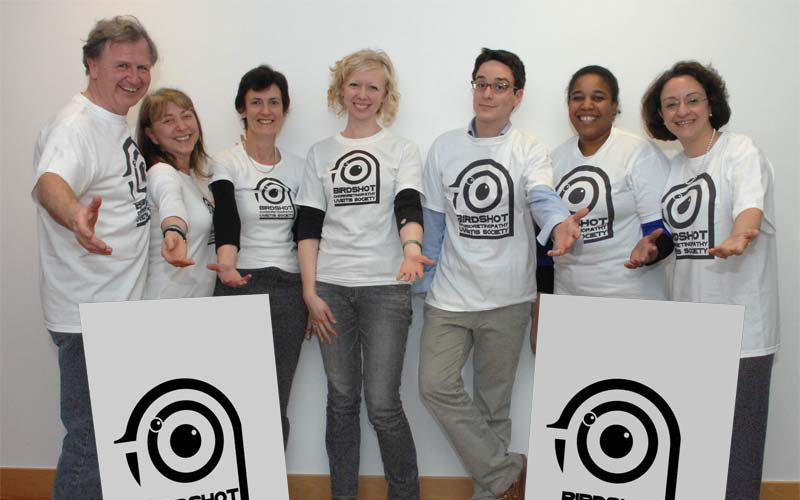UCL Engagement is delighted to announce the awardees in the latest round of Train and Engage funding.
Train and Engage is a training and funding program for postgraduate research students, who are looking to connect their work with public groups. We are pleased to announce the eight successful projects awarded in the latest round of funding and brief summaries are below.
- Mai-Carmen Requena-Komuro – Department of Neurodegenerative Diseases, Brain Sciences.
“Let’s Go Fly a Kite” – lessening stigma on dementia in Chinese communities living in London.
This project will empower Chinese residents in London who live with a diagnosis of dementia to talk about their experience of dementia in an open and non-stigmatised environment together with a family member or a close friend. They will be invited to their local community centre for a kite making activity that will serve as a prompt for conversations on dementia guided by two Mandarin and Cantonese speaking researchers in dementia.
Each pair will make a personalised paper kite by inscribing Chinese calligraphy characters representing their identity and by attaching coloured strings reflecting the diversity of symptoms they experience. Everyone will then be taken to a nearby park to fly their kites, a frequently loved activity in many Chinese communities, symbolically letting go of the discomfort and cultural pressures linked to their diagnosis. Photographs will be taken throughout the day and will be posted on the community centre’s website.
- Emine Pehlivan – Education, Practice and Society, Institute of Education.
Awareness Months: Learning my heritage culture through singing and folk dance.
This project aims to deliver a series of cultural sessions to Kurdish descent young people aged 11-14, who participate in a supplementary school in North London. The aims include to create a vehicle for youth to learn about Kurdish culture and to create a space for them to discuss sense of connection or separation to their cultural heritage. By learning about Kurdish cultural heritage through art, music, and folk-dancing, the participants will feel re-connected and would hopefully develop healthy relationships with their peers and schools. In partnership with a community organisation, we created an open space for the youth (a) to highlight educational issues faced in British schools; (b) propose some solutions to overcome these issues. Accordingly, the feeling of disconnection from Kurdish cultural heritage and desire to learn about it have been the main themes of the discussion sessions. This project is the product of those sessions held in the community centre with the Kurdish youth.
- Amanda Clery - Great Ormond Street Institute of Child Health, Population Health Sciences.
Bringing families and health visiting together.
Health visiting is a key component of the support young families receive. It is important that parents understand the role that a health visitor plays in the basket of services available to them and their child, and the opportunities to improve this understanding through research. This project will be a workshop and play day to bring families and health visiting together. It will be a day of activities including learning about, and contributing to health visiting research, sharing experiences, and engaging with researchers and other parents, hearing from a health visitor about what they do, and a talk and play session for children and parents. Overall, the project will be an opportunity for parents to learn, ask questions, and get involved in research while meeting other families.
- Sana Zard – Clinical, Educational and Health Psychology, Brain Sciences
Exploring mental health needs within the Kuwaiti Bidoon community in London.
The Kuwaiti Bidoon are a group of stateless persons who reside in Kuwait, who, as a result of their legal and administrative status, face systematic discrimination and a lack of access to basic rights. The Kuwaiti Bidoon community in the UK are extremely marginalised and there can be difficulties accessing and engaging with healthcare services. There is no existing research into the mental health experiences of this group. This public engagement project will aim to establish a sustainable relationship with the Kuwaiti Community Association (a voluntary organisation which supports members of the Bidoon community in London), in order to involve this community in shaping the direction of research to respond to community need, and to provide the Kuwaiti Community Association with an opportunity to access consultation from psychologists to co-create a mental health workshop, as well as to inform their own community projects about raising mental health awareness.
- Aneeza Pervez – Psychology and Human Development, Institute of Education.
Fostering Kindness and Helpfulness in Primary School Children.
The project aims to foster kindness and helpfulness in children via dialogue and classroom activities. The public engagement activity will be divided into three main phases:
Phase I: online focus group sessions will be conducted with teachers. The session will aim to investigate teachers’ perspectives on prosocial behaviours and gain insights into existing teaching strategies that aim to foster kindness and helpfulness in children.
Phase II: This phase will involve the development of character sketches of helpful/prosocial children. These character description will be based on results from the first study of my doctoral project and on the insights gathered during phase I of the PE activity. These descriptive sketches will then be shared with a designer to help create digital cue cards. An information booklet will also be prepared for the teachers.
Phase III: A workshop activity will be held, where the activity leader will share the engagement guidelines and resources (character cue cards) with teachers. This will be followed by a discussion on the most effective ways of incorporating the resources in existing teaching framework.
- Laurette Bukasa – Great Ormond Street Institute of Child Health, Population Health Sciences.
Involving women living with HIV in dialogues around outcomes of children born HIV-free.
This project aims to inform and consult with a group of women living with HIV on the surveillance and research of their children who are born HIV-free. Current research plans include an exploration of birth, cancer, and mortality outcomes of these children in the UK.
Through partnership with a key peer-support network for mothers living with HIV, two focus group sessions will be held enabling women to provide their feedback and ideas on key aspects of the project and engage in dialogues with other members of their community about the research. Each participant will be provided with resources to creatively record their ideas during the sessions, and their discussions with their wider network. This feedback will be collated and used to frame the research agenda, and future engagement activities with the affected communities. The findings from the project will be published in a co-authored peer-reviewed open access publication.
- Claire Grant – Department of Epidemiology and Public Health, Population Health Sciences.
Maternal health and care proceedings.
This project aims to engage with women and organisations affected by maternal health and child protection to inform the direction and conduction of research work. A project advisory group will be established which will act as a ‘knowledge-exchange’ partnership between the research team and publics. Members of the project advisory group will be invited to take part in one of two collaborative workshop sessions (February 2022) as well as comment on research materials by email. Creating a dialogue between researchers, birth mothers and support staff interested in, or affected by, child protection will enrich the quality and meaning of the research and provide a forum for ongoing communication and collaboration.
- Erica Ranzato – Psychology and Human Development, Institute of Education.
Teaching mathematics to students with Down syndrome.
Mathematical abilities are a particular area of difficulty for students with Down syndrome (DS) and this has an effect on their quality of life and level of independence. As reported by the International guidelines for the education of learners with DS, the learning of students with DS can be enhanced with good teaching and tailored support. This project aims to give a voice to teaching staff supporting students with DS in primary school settings, to reflect on the current teaching practices and to co-develop learning resources to support mathematical skills of their students.
Participants will take part in 3 online sessions. During Session 1, participants will share their experiences on supporting mathematical abilities of the students they are working with. In Session 2, they will co-develop learning resources and tailor learning targets. In Session 3, participants will be asked to discuss their experience on using the resources co-created.
 Close
Close




